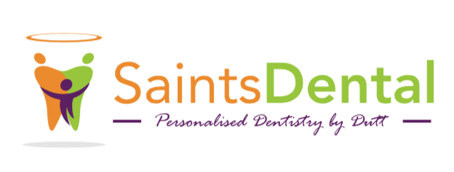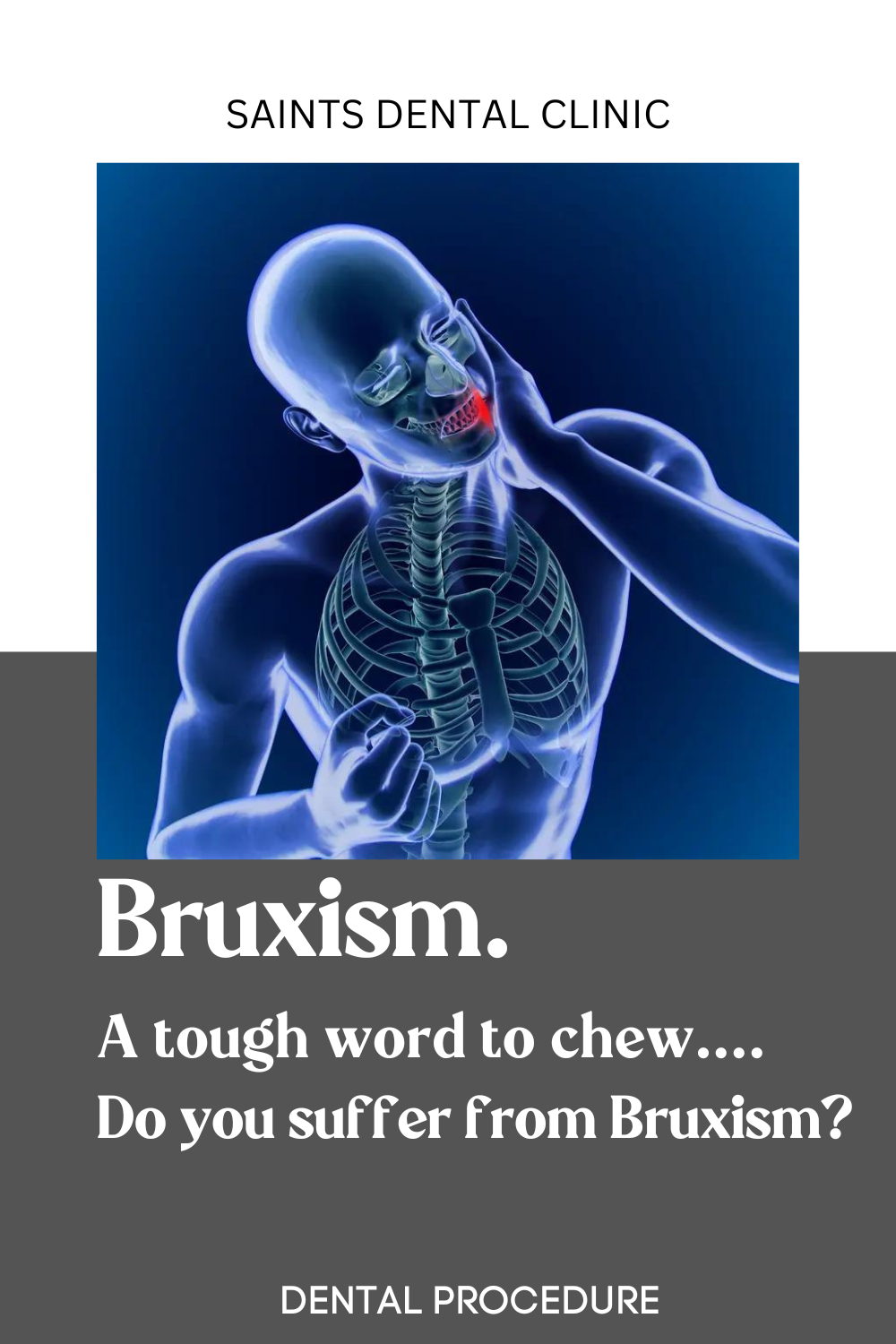At Saints Dental, treating Bruxism is a walk in the park. It’s more so about ensuring that
you don’t need to have any further infections or diseases due to ill-fitting over the
counter mouth-guards. That means you can snooze without stress for the next day of
work, and once you’re at work, there won’t be any need to worry that you’re bothering a
co-worker who can’t stand the sound of teeth grinding!
Bruxism might be a tough word to chew, but it’s better to get to a dentist to ensure that
your teeth don’t become stumpy or crooked. Saints Dental is highly experienced in
dealing with patients who suffer from excessive tooth-grinding. Scientists have debated about the causes of Bruxism for years, but have only come to the conclusion that it is from having Sleep Apnea, an anxiety disorder or even another chronic health condition that causes tooth-grinding that must be treated to save your teeth.
Not to worry, Bruxism is easily relieved and treated at Saints Dental. Here is the information you’ll need to self-assess and book-in for a check-up if need be. Which means that you won’t have to worry about looking in the mirror to notice shorter teeth anytime there afterwards.
BRUXISM AND HEALTH CONDITIONS:
● Parkinson’s Disease
● Dementia
● Gastroesophageal Reflux Disorder (GERD)
● Epilepsy
● Night Terrors
● Sleep-Related Disorders
● Anxiety
● Neuroticism
All of these conditions may be the reason for your Bruxism. You may need a prescription for tablets to numb the pain caused by excessive tooth-grinding which can prevent you from being able to chew all the foods you consume. Excessive tooth-grinding from a health condition or even a single condition of Bruxism, can lead to brutal results such as cracked teeth or a lack of enamel on teeth to protect pearly whites from yellowing after lunch.
According to Dr Leena Palomo of the Case Western School of Medicine who was
interviewed by the New York Times- A quick fix mouthguard for teeth-grinding at the
chemist, can potentially make aging, gum disease or inflammation increase. It’s risky,
and can result in more invasive and traumatic treatment of a person once they return to
the dentist.
Bruxism if left unattended can be a costly cosmetic or dental issue thereafter to fix! We
can challenge the appearance of a hollowing or crooked jawline, with ground down
teeth, some can lead to all but just some tiny measurements of teeth left, just by visiting the Dentist. Though, such results are best prevented with a Routine Appointments.
Top Bruxism Complaints:
- Those with Parkinson’s Disease may suffer from spasms and this can further
affect the muscles of the jaw, and cause them to clamp shut. - Putting tremendous force on teeth causes them to wear down over time, become
loose, have flattened tops, worn enamel, chips and fractures. - Earaches, or causing more noise than necessary which can affect your personal
and professional relationships negatively due to teeth-grinding. - Being unable to eat, drink or speak due to having difficulty opening and closing
your mouth. - Resting your head could lead to neck-pain after sleeping as a tooth-grinder.
- Headaches due to build-up of tension and from non-stop tooth-grinding.
Though, perhaps the biggest complaint from Bruxism of all and the absolute Number One is:
Not enough Sleep.
BRUXISM FROM SLEEP APNEA
Sleep Apnea is known to be caused by snoring or an inability to get enough REM, or deep sleep before waking up, being unable to snooze, repeatedly. Tooth-grinding is another leading cause. To stop tooth damage overnight, the dentist will provide you a custom mouthguard that will first stop the noises of Bruxism so that both you and your spouse can rest with ease, as well as preventing tooth loss and cracked teeth.
BRUXISM FROM ANXIETY DISORDERS
Brutal, is a term that might even induce Anxiety itself. Supposing that teeth could
receive metal replacements or have an uneven structure, could lead to an entirely
different architecture of the mouth over a long period of time. Which means that getting
a custom mouth guard is a big sigh of relief, that could fix up the issues perhaps even straight
away. Saints Dental can mold a custom mouth-guard that can even prevent you from chewing or biting the side of your mouth inside instead.
Here’s a few at home treatments to assist with pain. Between now and your next
appointment.
- Avoid Alcohol, caffeine, smoking or anything that could yellow your teeth.
- Drink plenty of water.
- Manage your stress levels. Once you have your mouthguard or medically prescribed tablets, napping can even stop jaw-clenching that leads to neck pain.
- Make sure to schedule regular visits to your dentist, just to ensure that your teeth aren’t going through further damage.
- Give yourself a face massage around the jaw area.
Have you had damage to your teeth from Bruxism? Don’t worry, we’ll take you through the key terms to know before starting with a Dental Appointment:
Here are the terms that Saints Dental may use to describe the main effects on
your teeth, due to Bruxism.
Abfraction
Abfraction is like looking at a rocky surface. A space between the gum and the tooth,
the gums having risen up high, and the teeth, leaving a crooked dent before the tooth
runs its course to the bottom. Biting on food, chewing random objects or grinding
down on enamel, can lead to what’s known as a ‘tooth lesion,’ especially at the cementoenamel junction. By the time there is a tooth micro-fracture there is likely to be tooth tissue loss.
Gum Recession
Gum Recession is the process in which the gum tissue is rising to a point where the
teeth are more highly exposed. Leaving the gum lifted higher towards the tooth’s root.
When gum recession occurs, “pockets,” or gaps, form between the teeth and gum line,
making it easy for disease-causing bacteria to build up. If left untreated, the supporting
tissue and bone structures of the teeth can be severely damaged, and this could result
in tooth loss.
Attrition
Can lead to accelerated aging due to the process of the tooth’s strong surface wearing
down, making teeth more susceptible to disease, especially without routine dental
appointments to prevent the build-up of plaque or biofilm. Attrition is ultimately the loss
of the tooth’s best-looking shape, including sharpness for biting.
The main thing about Bruxism is:
Pain can occur, making it difficult to open and close the jaw. The loss of the tooth’s shape can lead to tooth replacements. Just to assist with eating, speaking and drinking, as well as to preventing cosmetic damage and signs of aging. Shorter teeth can lead to an inability to chew, or even put too much strain on the muscles that move that not only retain the shape of the face, but are used to chow down on your favorite meals.
Bruxism makes it too difficult to call your favourite fast-food for delivery without being held-back. Ensure you can move the jaw and make the face work muscles to retain its best shape, and prevent any kind-of masseter hypertrophy (a reformation of the tooths natural structure.)
Here is what to do.
Give Saints Dental a call and we’ll book you in for an appointment to discuss the best
treatment options for your case right away.
This website should not be used as a substitute for professional medical advice, and as a source of information for general purposes. If you have any specific questions than please ask a dentist or a qualified medical practitioner. Saints Dental assumes no responsibility for liability on the actions of its readers. You should always book-in first to consult a qualified and licensed dentist or medical practitioner for assistance regarding your Dental health or other specific needs.

